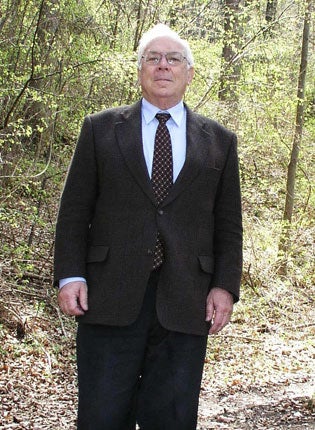Adolf Merckle: German entrepreneur who made billions in pharmaceuticals and industry

Adolf Merckle was one of Germany’s, and the world’s, richest entrepreneurs who, after 40 years of success transforming his family business into a world-wide conglomerate deliberately threw himself under a train.
Merckle was born in Dresden in 1934, the son of the industrialist Ludwig Merckle. His grandfather Adolf had established a pharmaceutical business in 1881 inAussig, then part of the Austro-Hungarian Empire, and Ludwig took over in 1915. Ludwig had married into wealth, his wife, Luise, being a daughter of the Spohn industrialist family, makers of luxury cars.
Aussig was incorporated into the Third Reich in 1939 but after the Czech takeover in 1945 there was a German exodus, and the Merckles ended up in the small town of Blaubeuren in the state of Baden- Württemberg in what had recently become West Germany.
There, Ludwig Merckle re-established the business. The family was part of a remarkable generation determined not to go under, building the Wirtschaftwunder, or economic miracle, of the 1950s when German businesses seemed able to conquer markets worldwide. Adolf was a secondary- school pupil during the early Aufbau [construction] years; after studying law in Tübingen, Hamburg and Grenoble, he worked as a lawyer in Hamburg. In 1967 he inherited the pharmaceutical firm from his father. It then employed 80 and had an annual turnover of DM4m.
Like his grandfather and father, Adolf married into an entrepreneurial family. His wife, Ruth, was part of the Ulm cement dynasty. An ambitious man, Adolf started on an expansion programme. In 1973 he founded Ratiopharm, Europe’s first manufacturer of generic pharmaceuticals: the business idea was as simple as it was successful, specialising in the production of wellknown medicines whose patents had expired. This allowed it to offer highquality products as effective as the original but considerably cheaper.
Revenues shot up from DM250,000 in 1973 to 10 times that a year later.
Starting out with 18 products in 1973, Ratiopharm now has a range of approximately 750 products. In 1986, it went into non-prescription medicines and was one of the top 10 German pharmaceutical companies.
Three years later, Ratiopharm claimed first place. In addition to its headquarters in Germany, Ratiopharm is represented worldwide with branches in 25 countries and products available in 35 countries.
ButMerckle’s ambitions did not end with Ratiopharm. In 1994 he established Phoenix Pharmahandel as a wholesale pharmaceuticals supplier, by merging firms in Hamburg, Berlin, Mannheim, Nuremberg and Cologne, thereby gaining 30 per cent of the market. Other acquisitions followed, including large stakes in the HeidelbergCement firm, Hanson plc, the vehicle manufacturer Kässbohrer, and Castle Cement, which controls 20 per cent of the British market, as well as other British firms.
For many years family members were involved in the business. Ruth Merckle was on various company boards and was in charge of the 4,000 works of art that hung on the walls of the Merckle enterprises. She also paid for a full-time woman vicar to care for the workforce. The Merckle’s eldest son, Ludwig, was a member of most, if not all, the boards of the Merckle companies.
His second son, Philipp, a qualified pharmacist, was responsible for developing the pharmacy side of the business. Their sister, Jutta, an economist, was also involved. Only the third son, Tobias, was clear of the business, working as a missionary among prisoners at home and abroad.
Merckle’s problems began with his removal of Philipp from Ratiopharm last March after allegations of irregularities.
He then banned family members from involvement in the companies. Then came the world credit crunch. HeidelbergCement overstretched itself when it took over its British competitor, Hanson, with the help of Deutsche Bank and the Royal Bank of Scotland. Shares used as collateral suddenly lost their value.
Merckle made a speculative investment based on his belief that Volkswagen shares would fall; then, in October 2008, after Porsche increased its stake in the company, Volkswagen’s share price jumped in two trading sessions from €210 to just over €1,000, causing heavy losses for Merckle. The 30 creditor banks financing the deal became nervous and demanded more security. Merckle was about to lose control and see his empire broken up; the fate of the 100,000 employees was uncertain.
Merckle was unusual among tycoons in that he did not go in for most of the trappings of wealth and celebrity, though he did own a yacht.
For years he rode in an old Mercedes and sometimes even cycled to work, while on rail journeys he travelled second class. Yet in 2007, according to Forbes he was worth US$12.8bn, and by December 2008 he was still worth $9.2bn, though he had long-running disputes with the tax authorities. His family enjoyed great influence in Blaubeuren, with some streets named after family members. He and his wife were elected Ehrenbürger (honorary citizens) and in 2005 he received the German Federal Cross of Merit.
Merckle committed suicide on 5 January by throwing himself in front of a train near the family home in Blaubeuren. His motto was “Mir ist fremd, etwas aufzugeben” [“It is alien to me to give up anything”].
David Childs
Adolf Merckle, born Dresden, Germany 18 March 1934; married Ruth Holland (three sons, one daughter); died Blaubeuren, Germany 5 January 2009
Subscribe to Independent Premium to bookmark this article
Want to bookmark your favourite articles and stories to read or reference later? Start your Independent Premium subscription today.

Join our commenting forum
Join thought-provoking conversations, follow other Independent readers and see their replies